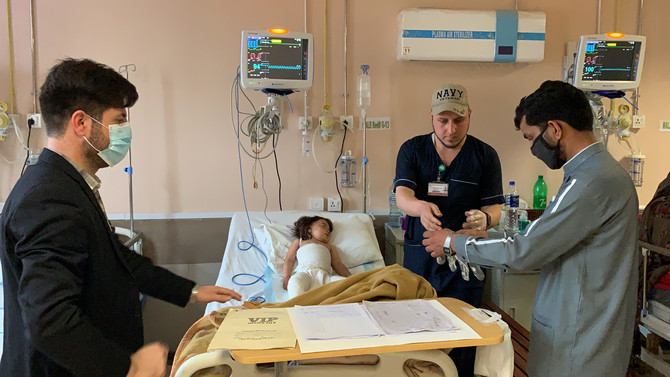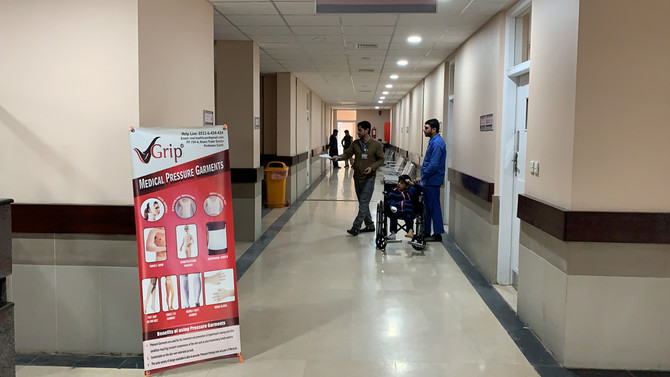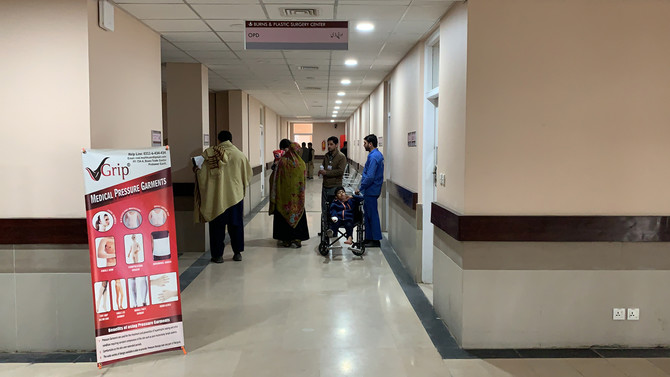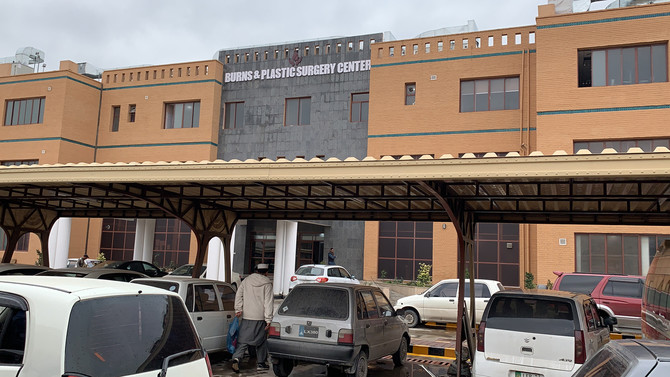PESHAWAR: After decades of waiting, Khyber Pakhtunkhwa’s first specialized Burns and Plastic Surgery Center (BPSC) will be formally inaugurated later this month, officials said on Thursday.
Professor Dr. Tahir Khan, the center’s project director, told Arab News that the medical facility, which boasts state-of-the-art equipment, became operational in November last year after facing several delays due to the non-availability of funds.
“A plastic surgery unit started operating at the Hayatabad Medical Complex in February 1997. However, it did not have a dedicated burns unit, and many people in the province were forced to go to the Burns Center in Kharian, Punjab, or similar health facilities in Islamabad. Treating burn injuries is expensive, and some of the victims ended up paying more than half a million rupees to these medical facilities,” he said.
The three-story building has 50 beds for patients, including a ward each for male, female and child patients, eight Intensive Care Units, and separate isolation and dressing chambers.
The plastic surgery section has three wards comprising 18 rooms each, including four operation theaters and five high dependency units.
Khan said that the facility cost nearly Rs3 billion to set up. “The USAID donated $15 million while the Khyber Pakhtunkhwa Workers Welfare Board and others gave nearly Rs3 billion to restart construction work on the project in 2017. We purchased most modern equipment from other countries,” he said.
“Thanks to our partners, including a German non-governmental organization, we were able to send five of our staff members for specialized training to the UK for two months. We intend to arrange more training programs like that to equip our staff with modern skills,” he said.
“The facility has treated 3,362 patients in less than three months after it became operational. A total of 528 burn surgeries and 487 plastic surgeries were also performed during this period,” Dr. Iqbal said, adding that the center provided preliminary emergency care, hand replants, free tissue transfer, trauma care and treatment for skin tumor.
The BPSC will also be supporting peripheral units in Bannu, Chitral and Dir districts of the Khyber Pakhtunkhwa province, besides providing free medicines and staff training to two similar units in Afghanistan.
“Almost 40 percent of our patients come from Afghanistan. They get the same free-of-cost treatment as our local patients,” Professor Khan said, adding that the BPSC was also training doctors at Peshawar’s Lady Reading Hospital and the Khyber Teaching Hospital.
Professor Khan added that the provincial government had been asked to establish 20-bed units for burn victims at the divisional level to provide timely medical care to patients belonging to far-flung areas.
Khyber Pakhtunkhwa’s first plastic surgery center to get a facelift
Khyber Pakhtunkhwa’s first plastic surgery center to get a facelift

- Facility provides free medicines and training to similar organizations in Afghanistan
- Province also expected to set up small-scale burn units at the divisional level
Envoy shares potential of Pakistan freight corridors, ports for regional connectivity at Dubai event
Envoy shares potential of Pakistan freight corridors, ports for regional connectivity at Dubai event

- The Global Logistics Alliance conference brings together over 2,000 industry leaders, experts and potential partners to explore logistics opportunities
- The development comes as Pakistan strives to boost trade, overseas investment amid a gradually healing macroeconomic environment after a prolonged downturn
ISLAMABAD: Pakistan’s Envoy to the United Arab Emirates (UAE) Ambassador Faisal Niaz Tirmizi has underscored Pakistan’s freight corridors, port projects at a global logistics conference in Dubai, saying the South Asian has the potential to become a crucial hub for regional trade, transport and economic cooperation.
Ambassador Tirmizi said this while delivering a keynote address at the 12th Global Logistics Alliance (GLA) conference in Dubai, according to Pakistan’s Press Information Department (PID).
The three-day event, running from May 15 till May 18, has brought together over 2,000 industry leaders, experts and potential partners from 130 countries to network, acquire knowledge and explore opportunities in the logistics sector.
In his speech, Ambassador Tirmizi highlighted Pakistan’s strategic location at the crossroads of South Asia, Central Asia and West Asia as well as the Middle East.
“Pakistan is poised to become a vital corridor of connectivity and cooperation across the region,” he said, lauding the UAE-based firms DP World and AD Ports for their investments in freight corridors and port development projects in Pakistan.
The development comes as Pakistan strives to boost trade and overseas investment amid a gradually healing macroeconomic environment after a prolonged downturn that forced Islamabad to seek external financing from friendly nations and multiple loan programs with the International Monetary Fund (IMF).
The Pakistani government has pursued aggressive economic diplomacy in recent years, signing several agreements and memoranda of understanding with countries in Central Asia and the Middle East.
In her remarks, GLA President Grace Sun emphasized the importance of the event in creating new business synergies and accelerating global logistics collaboration.
On the sidelines of the conference, Ambassador Tirmizi and Sun discussed the potential of organizing a regional networking conference in Pakistan under the GLA framework, with a focus on engagement from South and Central Asian logistics stakeholders, according to the PID.
Ambassador Tirmizi reaffirmed Pakistan’s commitment to working with international partners to develop “smart, efficient, and sustainable logistics infrastructure,” particularly through transformational initiatives like the China-Pakistan Economic Corridor (CPEC).
Pakistani animated film ‘The Glassworker’ heads to US theaters with Watermelon Pictures

- The Pakistani animated film revolves around two people from disparate backgrounds, a glassblower and a violinist
- The movie, selected as Pakistan’s submission to the 2025 Academy Awards, took the animation world by storm in 2024
ISLAMABAD: Pakistan’s first hand-drawn animated film “The Glassworker” is set to screen in the United States (US) after Watermelon Pictures acquired its distribution rights, the US-based film production and distribution company said this week.
The Glassworker, released in Pakistan in July last year, was storyboarded by young Pakistani animator, Usman Riaz, who also directed the movie that comprised 1,477 cuts and 2,500 individual drawings, bringing to life the coming-of-age tale of two people from disparate backgrounds: young Vincent who is an apprentice at his father’s glass workshop, and the talented violinist Alliz, the daughter of a military colonel.
Around them, a war threatens to upend their lives and the relationships between the children and parents are tested. A total of 250 people worked on the film including national and international cast and crew.
In a post on Instagram, Watermelon Pictures said they were proud to announce that their very first animated feature, The Glassworker, would soon be coming to US theaters.
“After being selected as Pakistan’s submission to the 2025 Academy Awards, #TheGlassworker took the animation world by storm as Pakistan’s first ever hand-drawn animated feature,” the distribution company said.
“An ode to Hayo Miyazaki’s dedication to telling beautiful stories frame by frame, The Glassworker is truly a work of art.”
The deal was closed during Cannes and negotiated by Hamza Ali for Watermelon Pictures and Hélène Espeisse on behalf of Charades, which is representing the film at this year’s Marché Du Film, US entertainment website DEADLINE reported.
“The Glassworker is a breathtaking, emotional story that will resonate deeply with audiences of all ages. We are honored to bring this cinematic gem to US theaters,” Watermelon Pictures co-founder Hamza Ali was quoted as saying.
Ali launched the film production and distribution company in April, 2024 along with his brother, Badie Ali, with Alana Hadid as creative director. The firm aims to amplify the voices of underrepresented filmmakers across the globe.
“We are thrilled that The Glassworker will be released theatrically in the United States by Watermelon Pictures. Their rapid growth and recent string of successful, meaningful films make them the perfect partner to bring our work to American audiences,” Khizer Riaz, the film’s producer, was quoted as saying.
“We couldn’t be more excited.”
Pakistani woman police officer wins Global Investigation Award in Dubai

- ASP Anum Sher Khan was awarded at the World Police Summit 2025 for the rescue of two young girls from human traffickers and arrest of suspects
- Another Pakistani officer, Muhammad Isa Khan, secured the second position in the ‘Best Artificial Intelligence Implementation in Policing’ category
KARACHI: A Pakistani woman police officer, Anum Sher Khan, has won the prestigious ‘Excellence in Criminal Investigation’ award at the 2025 World Police Summit Awards in Dubai, the Punjab police said on Friday.
The World Police Summit 2025 featured conferences, strategic sessions and workshops that focused on four main areas, including combating organized crime and promoting community policing, the use of artificial intelligence in policing, capacity-building for junior officers, and enhancing road safety and traffic enforcement.
Themed as “Beyond the Badge: Envision the Next Era of Policing,” this year’s summit explored critical global challenges such as cross-border crime, public-private security collaboration, and AI integration across law enforcement. The four-day event featured 12 core policing tracks delivered across four specialized conferences, covering topics like cybercrime, border security, anti-narcotics efforts, road safety, and human trafficking.
Khan said she was recognized for her successful rescue of two young girls from human traffickers and bringing the perpetrators to justice, adding the award validates her team’s dedication and acknowledges the positive impact of their work on the lives of victims and their families.
“I’m deeply honored to have received the Criminal Investigation Award, representing the Police Service of Pakistan at an international forum,” Khan, who currently serves as Sub-Divisional Police Officer (SDPO) Sargodha, told Arab News.
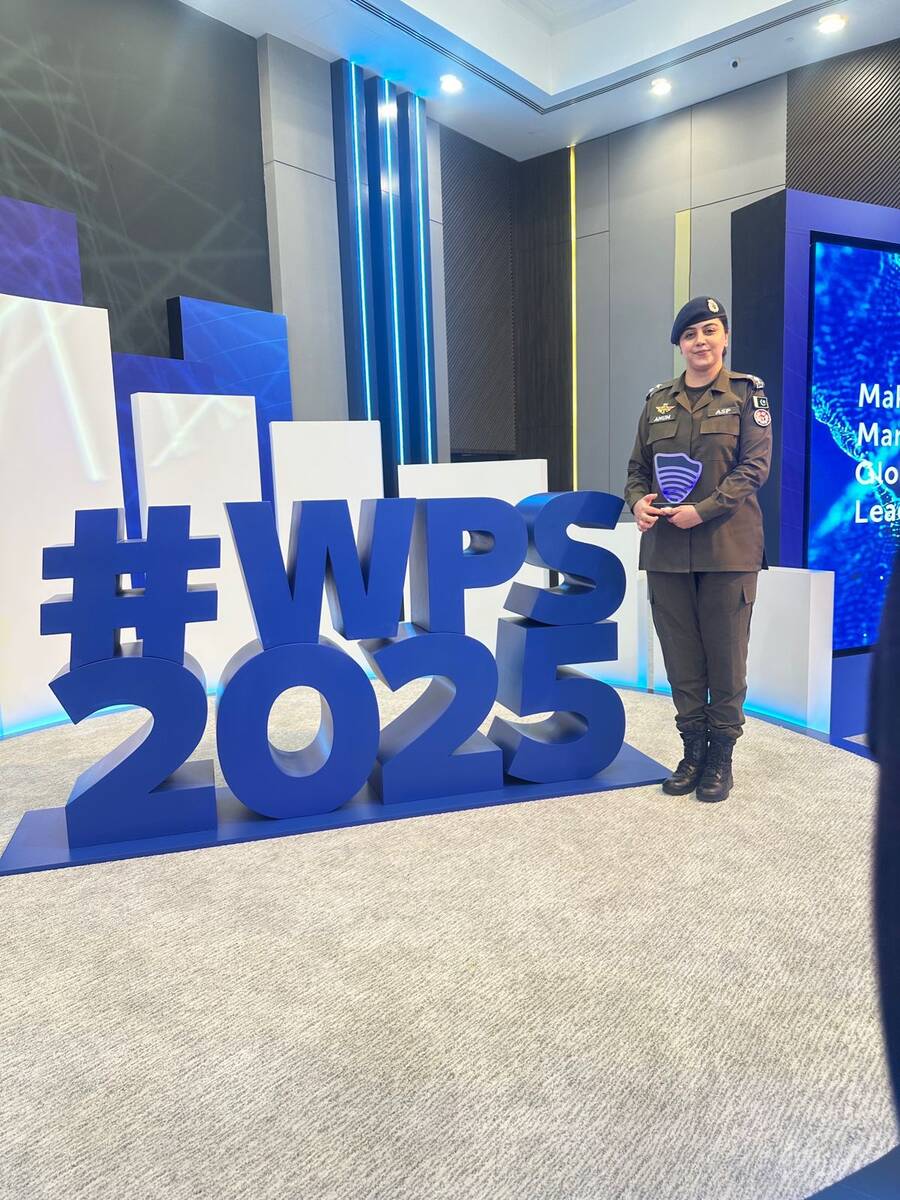
“This case underscores the critical role of law enforcement in safeguarding vulnerable populations. I’m grateful for the recognition and look forward to continuing Punjab Police’s efforts in making our communities safer. The World Police Summit provides a valuable platform for sharing best practices and recognizing excellence, and I’m proud to be part of it.”
In a post on Facebook, Punjab Inspector-General Dr. Usman Anwar congratulated Khan on winning first position in the Excellence in Criminal Investigation Award 2025 category for her “outstanding performance in criminal investigation.”
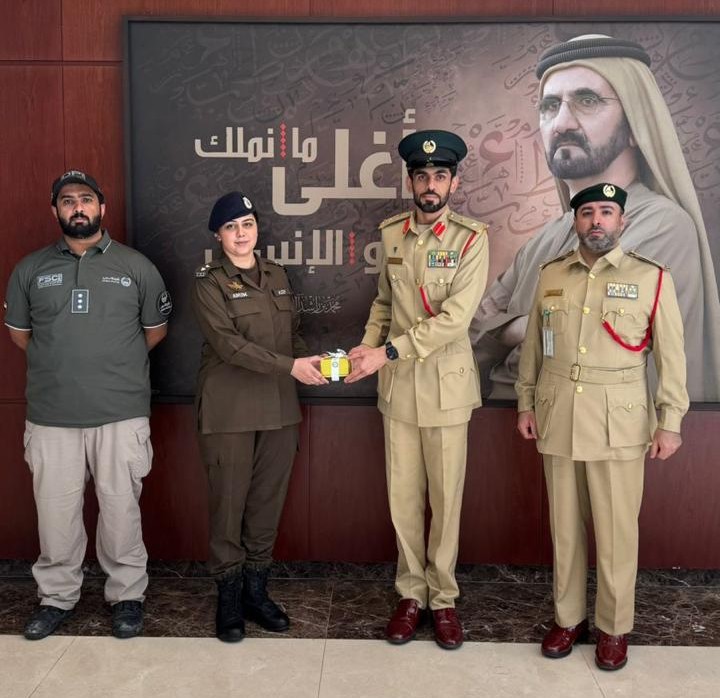
“Talented police officers like ASP Anum Sher Khan are the pride and valuable asset of Punjab Police,” Dr. Anwar was quoted as saying.
The jury considered police officers from 192 countries for the awards in various categories, and Khan was not the only Pakistani police officer whose exceptional services were recognized at the event.
“DPO [District Police Officer] Kasur Muhammad Isa Khan was awarded second position for his high performance in the ‘Best Artificial Intelligence Implementation in Policing Award’ category,” the Punjab police said.
Organized under the patronage of the UAE government, the World Police Summit is one of the most prominent global platforms for recognizing excellence in policing. The recognition of Pakistani police officers.
Clashes between India and Pakistan upend lives in a Kashmiri village

- Following May 10 truce, residents of Gingal returned to assess the damage
- Those with intact or livable houses sheltered neighbors who had lost theirs
GINGAL: Mohammad Younis Khan was among 40 residents seeking shelter in a cowshed when shelling began in Gingal, a scenic mountain village in north Kashmir on the Indian-administered side of the de facto border with Pakistan. Men, women and children sought refuge in the 3-meter-by-4.2 meter (10-feet-by-14 feet) space, which they felt offered greater safety than their brick and cement homes.
Huddled together, they heard the swoosh and thunder of the projectiles being fired from both sides of the border. When they heard a very loud sound from just outside the shelter, they held their breath and expected the worst. But the projectile had landed on soft earth and detonated a couple of feet below the ground sparing them.
Younis, who could tell the outgoing projectiles from the incoming ones by the sound they made, described the impact outside “as if a lightning bolt had struck the ground.” They all feared that India and Pakistan were at war and they would not survive the night.
“We were so scared that we didn’t dare go out to a water tap just four feet away from the door even when the children were crying of thirst,” Younis told The Associated Press.
Mohammad Shafi and four family members were having dinner in their kitchen when they heard explosions and ran outside. They had just managed to reach the road when they saw a blast damage the kitchen they had been dining in. They ran down a slope and hid among trees.
It was the night of May 8, and the shelling had intensified from the previous evening. Nasreena Begum rushed out, leaving her special-needs son behind as he was too heavy to be carried. She was tormented but was relieved to find him safe at home the following morning.
Most residents left Gingal for the town of Baramulla about 40 kilometers (25 miles) south, where some saw their homes destroyed on TV or social media.
Naseer Ahmad, a Jammu & Kashmir police officer posted in south Kashmir, learned via Facebook that shelling damaged his Paranpillan home, instantly recognizable by the surprisingly intact large walnut tree beside it.
Following the May 10 ceasefire, residents of Gingal returned to assess the damage, finding their homes riddled with shrapnel. Those with intact or livable houses sheltered neighbors who had lost theirs.
About 160 kilometers (100 miles) south, the usually bustling tourist spot of Pahalgam is now quiet, its residents facing a different challenge. It was here when, on April 22, militants killed 26 tourists in the worst assault in years targeting civilians in the restive region.
Pahalgam, usually lively with May holidaymakers, is now deserted. Businesses are shuttered and tourist attractions within a 30-kilometer (18-mile) radius of the assault site are closed to locals and visitors alike.
Back in Gingal, Younis prays for peace.
“Where will we go if the clashes continue? Drones can reach anywhere,” he said. “Those who want war have never experienced it.”
Gunmen kill four paramilitary troops in attack on security post in Pakistan’s southwest

- No group immediately claims responsibility for the assault in Balochistan’s Khuzdar district
- Local official says security forces have surrounded the area and a hunt is on for the assailants
QUETTA: Unidentified gunmen targeted a security check post and killed four members of the Levies paramilitary force in Pakistan’s southwestern Balochistan province, officials said on Saturday.
The attack targeted the Samand post located some 20 kilometers from Khuzdar city in wee hours of Saturday, according to Deputy Commissioner Yasir Iqbal Dashti. Four Levies men were killed as a result of an intense exchange of gunfire.
No group immediately claimed responsibility for the assault but suspicion is likely to fall on Baloch separatists who have intensified their attacks in the province over the last one year.
“The attackers managed to flee by taking advantage of the dark and the bodies of the slain troops were shifted to the District Headquarters Hospital Khuzdar,” Dashti told Arab News.
“Security forces have surrounded the area and a hunt for the attackers is underway.”
Balochistan, Pakistan’s most impoverished province, has been the site of a decades-old insurgency, where separatist militants often target security forces, police, foreigners and ethnic Punjabi commuters and workers, who they see as “outsiders,” by wresting control of highways and remote towns.
In Jan., dozens of fighters of the Baloch Liberation Army (BLA) separatist group launched a brazen attack on Khuzdar’s Zehri town and seized control of its main market for hours. The militants had set government buildings ablaze and snatched Levies’ vehicles and weapons.
This month, gunmen killed three people, including two barbers from the eastern Punjab province, and set a police vehicle ablaze in Balochistan’s Lasbela district, officials said.
The separatists accuse Islamabad of exploiting the province’s natural resources, such as gold and copper, and accuse foreigners and people from other province of backing the Pakistani state. Successive Pakistani governments have denied the allegations and said they only worked for the uplift of the region and its people.





